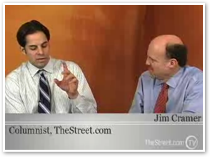

More Absurd iPhone Myths: iSuppli, Subsidies, and Pricing
Sometimes it's best to just ignore analysts and hope they go away. A new breed of Internet pundits have become increasingly difficult to ignore, however, because they insist on spewing the most absolutely absurd ideas, which are subsequently regurgitated by Digg and other leading sources of sensationalized misinformation.
Two weeks ago, Macworld: Ten Myths of the Apple iPhone attempted to head off the worst misinformation, but the Digg-style demand for new content, devoid of any editorial review or fact checking, has resulted in a veritable landslide of iPhone fear, uncertainty and doubt.
As a public service, additional iPhone myths will now be publicly shot in the face.
Myth 11: The iPhone will come with 18 months of free service.
Last Thursday, Gizmodo, among other web sites, cited Jim Cramer of theStreet.com as announcing that Cingular would be giving away a year and a half of service with the iPhone. The next day, Gizmodo "smashed" the rumor after simply asking Cingular if it was true and being told it wasn't.

One might wonder: why didn't Gizmodo fact check the day before, and spare the world an unnecessary rumor, as well as the need to recant it the next day? Short answer: both blog postings were submitted to Digg, generating tens of thousands of page views for Gizmodo's ads.
It also gave Gizmodo two new opportunities to direct attention to another blog entry, which insisted that the iPhone only costs $250 to make, and therefore it a) must not really be subsidized at all, and b) it is overpriced with a "fanboy tax."
What a tightly woven bunch of misinformation! Fortunately, something can be learned from the experience:
-
•Anything appearing on Gizmodo is not fact checked at all.
-
•Around half the iPhone-related content on Digg is simply recanting previous misinformation.
-
•Jim Cramer is a sensationalist nutcase.



Cramer is like Richard Simmons, Rush Limbaugh, and Steve Ballmer all rolled up into one. When he makes an insane prediction, it really isn't newsworthy, even for a blog like Gizmodo.
Saying that Cingular will give away $1440 worth of free service to perhaps ten million subscribers in order to earn just $480 from them across two years is an insane prediction.
Saying that this somehow makes sense because it would expand Cingular's market share is even more insane, because after two years, all those contracts would expire at the same time as Cingular's exclusive contract with Apple. It is absolutely absurd.

Weeks before the iPhone was announced, the article Inside Apple's iPhone cited Cramer in explaining how hedge fund traders spew misinformation to manipulate the market short term. Anyone who believes “insider rumors” needs to watch that video for a rude awakening.
Myth 12: The iPhone will not be subsidized at all.
Gizmodo shares the responsibility of this myth with Mac Rumors. Both somehow managed to stumble upon the idea independently, but wasted no time in posting it to Digg.
Gizmodo had just finished swallowing the iSuppli hypothetical price break down report on the iPhone without any fact checking (a ha!) and subsequently determined that if Apple is dramatically marking up the phone, then it is not only possible, but certain that the iPhone must not need a mobile provider subsidy. Boggle.
MacRumors, on the other hand, jumped to suggest that the iPhone isn't subsidized at all because a reader had reported that Apple isn't allowing phone companies to further discount the iPhone on longer term contracts.
In other words, if providers can't offer the iPhone for, say $300 with a 3 year contract, then there must not be any subsidy going on at all. Boggle.
This is absurdly puzzling logic on both fronts. We know the iPhone is subsidized because Apple and Cingular came out and said it. There is no controversy or doubt involved. The only possible variable is how much service will cost. Other new phones haven’t introduced new plan pricing, so its doubtful the iPhone will.
If $500 was the 4 GB iPhone’s retail price, it wouldn't be cited "with a two year contract." Adding a typical $250 subsidy to the iPhone makes it $750, the same price as unlocked phones with comparable hardware features:
Myth 13: The iPhone is marked up with a high "fanboy tax"
Gizmodo based its notion that the iPhone is grossly overpriced on an infamous report from iSuppli, which estimates that components in the 4GB iPhone only cost $245.83.
DisplaySearch, another analysis group, disputed the iSuppli estimate, saying that its own research indicated Apple's component costs would be "well above $300" for the 4 GB iPhone.
There are a number of problems with the iSuppli report, and the Gizmodo-fueled insanity that resulted from it.
First, everything is marked up, but consumer electronics are among those marked up the least. Apple's latest financial results provided guidance of 12% margins in 2007. If Apple plans to make $250 in profit on the iPhone, on top of getting a $250 kickback from Cingular on every phone, it would not be reporting such a conservative outlook to its shareholders.
Secondly, as pointed out above, the list price of the iPhone, plus a $250 subsidy from Cingular, is right in line with the hardware costs of other phones in its ballpark. In fact, Apple's phone is significantly cheaper than competitors when the price of 4 GB of Flash RAM is added.
RAM is one of the most expensive components in the iPhone. Even the highest-end phones on the market typically only have 256 MB--a quarter GB--of Flash RAM installed; most have 128 MB or less.
Third, the credibility and competence of iSuppli is difficult to estimate, because manufacturers don't ever make their actual component costs public. We simply have no way to judge how accurate iSuppli's reports have been in the past. The group has previously reported that:
Reports from iSuppli also change over time. More recently, iSuppli revised its estimates on the Xbox 360 to claim that Microsoft now spends only $323.30 on the $400 model, a difference of more than $200, 38% under its previous estimate. How much expertise is needed to tell us the Xbox 360 costs somewhere between $325-525?
Has Microsoft absolutely slashed its hardware costs, or is iSuppli just not very accurate in its estimates?
The fourth problem with iSuppli's estimate of the iPhone's component costs is that, while other breakdown estimates have involved taking hardware apart, this one was done by guessing what components Apple will be using. As the report itself states, "these figures are considered preliminary until we perform an actual physical teardown and analysis of the iPhone."
There is no public information on what parts Apple is using, and those parts are subject to change over the next six months; it doesn't even yet have FCC approval yet. Further, the cost of parts changes rapidly. That's why Apple has long term contracts with its component suppliers like Samsung. The terms of those contracts are secret, meaning iSuppli can only guess at Apple's costs.
That adds up to an awful lot of guesswork at iSuppli, despite providing a cost estimate down to the odd cent.
The report also provided no context of cost comparisons with other phones on the market. How much are phones usually marked up? Why didn't anyone think to ask before reprinting the story as gospel?
The estimate simply states that "the closest competitor to the Apple iPhone is LG’s [Prada] KE850," without pointing out that the LG Prada has a tiny fraction of iPhone's memory, no support for WiFi, half the screen resolution, and yet still manages to cost significantly more than the iPhone.
Why was there no stink about the “LG fanboy tax" from Gizmodo?
In reality, iSuppli simply used iPhone hysteria as an opportunity to float a sensationalist press release presenting the product as being grossly overpriced, and a wide swath of rumor blogs and supposed news sources picked it up without any critical thought.
All iSuppli wanted was the press attention for its breakdown services. All sensationalist bloggers wanted was to have something to complain about the iPhone. Nobody is interested in providing accurate information.
Myth executions continue tomorrow: iPhone third party software panic, security doubts, and Enterprise fears.
Next Articles:
This Series


 |
|
 |
|
 Del.icio.us |
Del.icio.us |
 Technorati |
About RDM :
:
Technorati |
About RDM :
:

Sunday, January 28, 2007






 Send Link
Send Link Reddit
Reddit NewsTrust
NewsTrust






